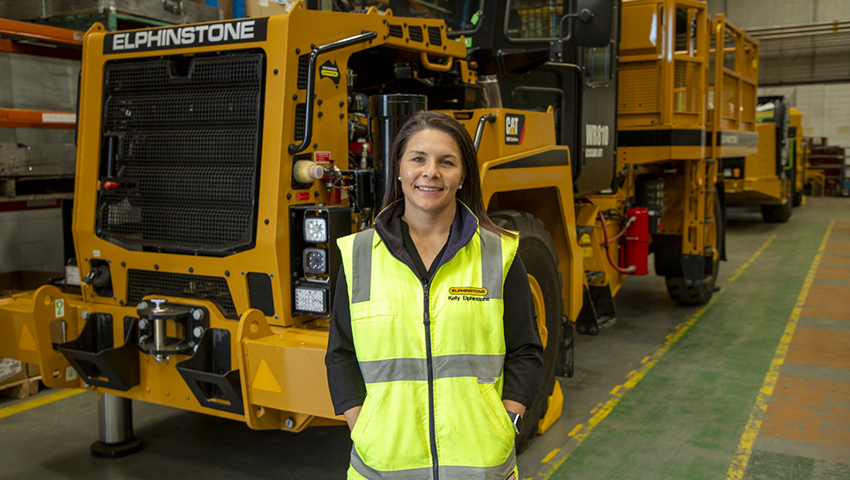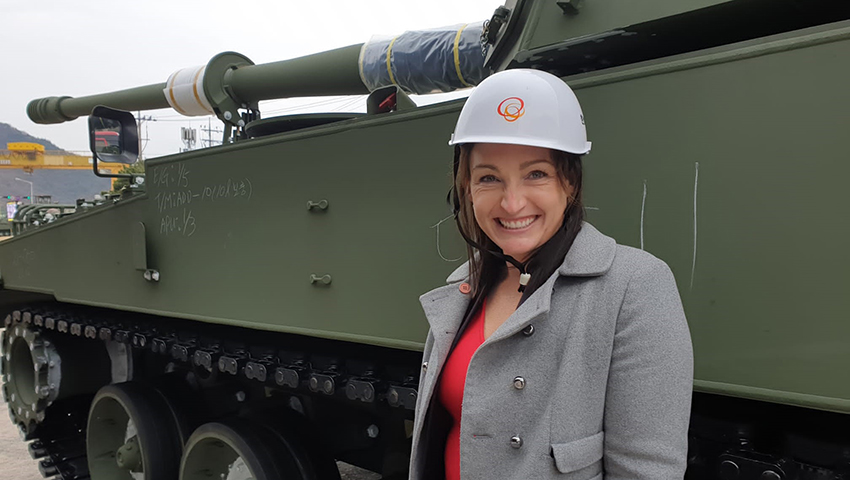Tasmania is fast-becoming a defence industry treasure-trove, with stakeholders increasingly identifying opportunities to harness the island-state’s manufacturing capability.
The wholesale embrace of the Commonwealth government’s push to build a sovereign defence industrial base by promoting Australian Industry Capability (AIC) has brought to light the untapped potential of the local manufacturing sector.
Established businesses with a proven track record in the commercial space have emerged as ideal candidates for defence-oriented expansion, given their access to a skilled workforce, infrastructure, and a supply-chain network.
Often overlooked, Tasmania has been punching above its weight as a melting pot for manufacturing firms looking to gain a foothold in the defence space.
The island-state has built up a reputation for housing innovation in naval technology, but in recent years, Tasmania has displayed its credentials for the land domain, with a number of local firms pursued by global defence contractors.
This shift is exemplified by Hanwha Defense Australia’s (HDA) engagement with the Tasmanian manufacturing sector, with the Korea-based company enlisting the support of local firms in a bid to establish itself as a key supplier of next-generation warfighting capability to the Australian Army.
Elphinstone Pty Ltd, CBG Systems, Penguin Composites and Delta Hydraulics, are among the Tasmania-based firms tapped to augment HDA’s offering.
 Kelly Elphinstone, Executive Director, Elphinstone Group (Aust) Pty Ltd
Kelly Elphinstone, Executive Director, Elphinstone Group (Aust) Pty Ltd
The Elphinstone experience
Based in Burnie on the north-west coast of Tasmania, Elphinstone Pty Ltd, a heavy machinery manufacturer, has cemented its reputation in the underground mining sector, supplying equipment to partners both domestically and abroad.
But after decades of success in the commercial space, the family-run company is beginning to make a name for itself in the defence industry.
According to Elphinstone Group executive director Kelly Elphinstone, daughter of founder Dale Elphinstone, the company did not proactively eye growth in the defence space, but was instead identified by established primes.
“We didn't really go looking for defence, defence found us,” she says.
Elphinstone Pty Ltd first burst on to the scene in 2015, after being courted by ‘Team Sentinel’, an Elbit Land Systems Australia-led cooperative gunning for the Commonwealth government’s LAND 400 Phase 2 Combat Reconnaissance Vehicles project.
Team Sentinel ultimately fell short, but the experience left an enduring mark on the Burnie-based manufacturer and on Tasmania as a whole.
“We established a lot of great relationships during that time and the experience really helped to put Tasmania on the map for defence,” Kelly Elphinstone continues.
“At the time, we were so busy trying to convince people Tasmania could make a valuable contribution. The most important thing we could do throughout the process was to get as many people as possible down to Tasmania so we could demonstrate our capabilities first-hand.”
The work reaped dividends, drawing the attention of HDA, which nurtured an existing relationship between the firms, culminating in the formation of two major collaboration agreements for HDA’s LAND 8116 Phase 1 contract and its bid to secure LAND 400 Phase 3.
The LAND 8116 Phase 1 contract, officially signed between the Commonwealth and HDA in December 2021, involves the delivery of 30 Huntsman AS9 Self-Propelled Howitzers and 15 Huntsman AS10 Armoured Ammunition Resupply Vehicles; while HDA are one of two shortlisted tenderers under consideration for the LAND 400 Phase 3 project for supply of up to 450 Infantry Fighting Vehicles (IFV) to the Australian Army.
Elphinstone Pty Ltd — selected to support the programs alongside its Tasmanian counterparts CBG Systems and Penguin Composites — would be tasked with manufacturing hull and turret structures for the vehicles.
And the Burnie-based company is ready to rise to the challenge.
“There are a lot of synergies between what we already do and defence,” Elphinstone adds.
“We manufacture big heavy vehicles for harsh environments and the GVM is very similar — our underground machines weigh about the same as a defence vehicle.
“There's also a lot of heavy fabrication and machining that goes into both products, so from a product perspective, the technology and the manufacturing process is very similar.”
Elphinstone Pty Ltd is also prepared to expand its defence unit in accordance with growth in demand for its offering, with the company eyeing opportunities to develop new infrastructure and expand its workforce.
HDA’s AIC ambitions in Tasmania
Tasmania has been identified as a strategic base from which to bolster HDA’s presence in the Australian defence ecosystem.
HDA is investing in the long-term success of the island-state’s manufacturing sector as part of a broader commitment to Australia’s AIC objectives.
After announcing itself in Australia as a contender for major defence procurement projects in 2019, HDA commenced a nationwide search for potential partners to complement its offering.
Despite encountering COVID-induced communication barriers, the defence prime managed to engage with approximately 700 firms in just 18 months.
Victoria and Tasmania-based firms emerged as ideal candidates, with HDA choosing to leverage the states’ collaborative track-record to spearhead its armoured vehicle development program.
According to Millie Keating, HDA’s head of the industry development unit and AIC, the company was particularly attracted to Tasmania’s diverse and community-oriented mindset, resembling HDA’s history as a family-owned company.
“There is a really strong and quite diverse manufacturing capability spread around Tasmania and the people are community-oriented,” Keating said.
“There are lots of regional companies who have a mindset that is similar to that of HDA — we are still a family-owned company.
“The values we have as an organisation around loyalty and trust, we see a lot of in the Tasmanian businesses we met with.”
HDA and Elphinstone Pty Ltd also share a common heritage in the mining sector.
“We're continuously exploring how we might work together on opportunities that suit our mutual interests,” Keating continues.
Another core element of HDA’s AIC agenda is its commitment to enhancing work opportunities in the regions, with the company looking to replicate its success in regional locations across South Korea.
This is reflected in the company’s partnerships with Burnie-based Elphinstone Pty Ltd, Derwent Park-based CBG Systems, and Penguin-based Penguin Composites.
Keating said HDA has sought to capitalise on the shift to remote work and decentralisation off the back of the COVID-19 pandemic.
“We are hopeful that we can open up a much broader talent pool and provide a solution to people who do want to live out of a capital city,” she says.
HDA has also invested in upskilling local partners to ensure their long-term viability.
This has included delivering a series of ‘vendor onboarding activities’ to around 40 preferred suppliers.
“We conducted a detailed visit and onboarding session that allowed us to identify where there could be gaps in a company's capability, and how we might address those gaps prior to a down-selection, contract, and formal onboarding process,” Keating adds.
Given HDA’s AIC philosophy and its decision to set up shop in Tasmania, firms across the state are set to reap the rewards, expanding their businesses and growing their local workforces as they challenge for defence projects now and into the future.
“It's not just about that next project or developing a capability specific to a particular customer,” Keating says.
“Our AIC plan looks beyond that — how are we bringing community requirements and preferences into our processes? How are we engaging, and connecting veterans with the skilling agencies involved in supporting HDA and our industrial network?
“For us AIC is about creating a sustainable and resilient industrial base over the long term.”
 Login
Login







